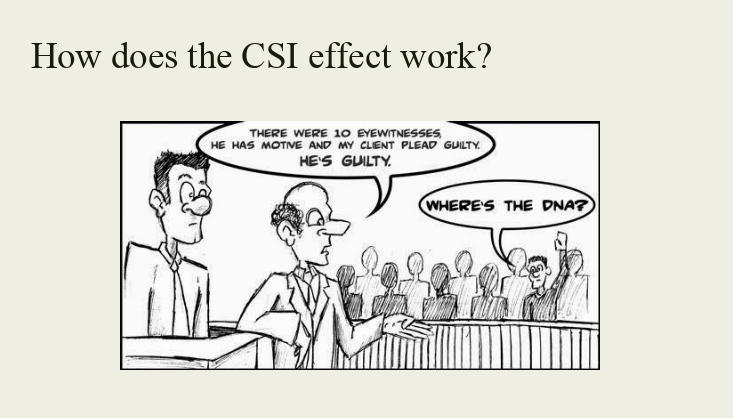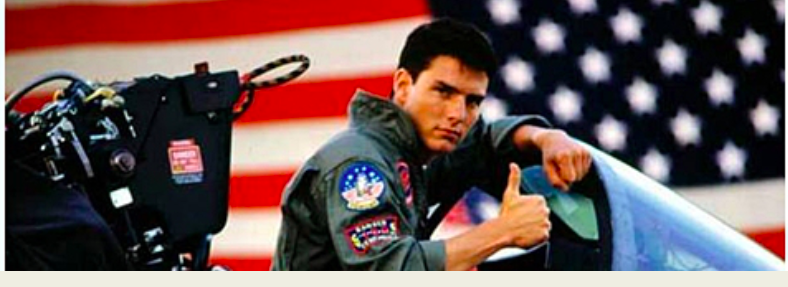Can Popular Culture really have an impact on our everyday lives? (AKA CMN 2180B - Fall 2019 - Class 7)
Having completed my law degree, one of my favourite topics - ok, let’s be honest, pretty much all of the topics that we look at in my class are my favourite, nevertheless… - one of my favourite topics to talk about is the “so-called” CSI Effect.
When thinking about whether and how popular culture can influence our behaviour or affect our lives, the CSI Effect provides a powerful case study. CSI: Crime Scene Investigation first aired in 2000; since then the series has spawned 3 spin-offs, novels, video games, comics, toys, board games, fan fiction (among other things). It has truly become a transmedia franchise. It’s also one of many (many!) crime drama programs - Law & Order and its spin-offs, Without A Trace, Criminal Minds - that aired around the same time. CSI, however, is arguably the program that most strongly emphasizes crime scene investigation and evidence collection techniques.
So, with that said, what is the CSI Effect? To begin, it’s a topic that has been and continues to be widely studied across all scholarly disciplines. At its simplest level, the CSI Effect is a hypothesis which argues that CSI and its spin-offs affect the expectations of the public (and therefore of juries) by exaggerating and glorifying forensic science.
Now, whether you believe that the CSI Effect exists or not, you might be asking yourself why it matters? Who cares whether the CSI Effect is real? And how could a TV show possibly influence jury outcomes?
Well, prosecutors (the lawyers trying to convict someone of a criminal offence) argue that the CSI effect creates greater expectations about the kinds of forensic evidence that should be presented at trials. They argue that because of shows like CSI juries now expect flashy, fancy, and high-tech evidence and when there isn’t enough or when the evidence isn’t ‘impressive’, juries are less likely to find that someone is guilty of a crime.
Prosecutors aren’t the only ones concerned about the CSI Effect. Defence lawyers are too! They are that it creates exaggerated faith in the reliability of forensic evidence when it is presented at trial and find that the outcome or resolution of cases on TV is often in favour of the prosecution and results in a conviction (I mean, after all, how many episodes end with the good guys “getting their man”?). Defence attorneys are concerned that juries don’t question forensic evidence even though forensic science errors do occur.
To better understand the CSI Effect, in this class, we looked at two articles - one from 2006 (when the CSI effect was first being studied) and one from 2016 (10 years later, where the existence and impact of the CSI effect was still being debated!).
In the first article, the two authors (Schweitzer & Saks) conducted an experiment to determine whether the CSI effect even existed. They asked 48 university students to read a script of a simulated criminal trial that include (fake) evidence - hair found on a ski mask left at the crime scene - and testimony from the “expert” who tested the evidence and found that it came from the defendant. Once the students had read the transcript, they were given a survey that asked them questions about the “trial”, the “evidence” and their TV viewing habits.
Schweitzer & Saks divided their study into three groups - CSI Viewers, crime drama viewers, and non-viewers. They found that, in comparison with the other groups, CSI viewers felt more confident in understanding the tasks of a forensic scientist and were more critical of the “evidence” presented in the “trial” (they found it less believable). They also found that CSI viewers were less likely to convict (18%) in comparison with non-viewers (29%). Similarly, viewers of crime dramas more broadly felt that they had a better understanding of the role of forensic scientists in comparison with non-viewers - although these two groups did not vary much more on other metrics.
This first paper found that the CSI Effect existed but also recognized the limitations of their study - it did not involve jury deliberations, which could reduce or magnify the differences between the three groups of TV viewers, and it was limited to one case and one set of facts. It also only relied upon one metric of analysis - a quasi-experiment.
It’s not surprising then that further studies were needed in this area of research. What is or may be surprising is that after 10 years of research, the existence and impact of the CSI effect were still hotly contested. So, in 2016, Shanz & Salfati undertook a systematic review and a meta-analysis of the literature to address this controversy.
Schanz & Salfati found that the CSI effect had been studied through anecdotal evidence, surveys (of jurors, lawyers, and law enforcement personnel), jury simulations, and looking at acquittal rates - among other things. They found that the literature was split on the existence of the CSI Effect, with some disciplines like the legal and criminal justice fields being more likely to argue that the CSI Effect not only exists but undermines the legitimacy of the legal system.
Literature on the CSI Effect finds that viewers of crime dramas develop positive but unrealistic expectations about the quality, availability, and accessibility of forensic evidence at a crime scene in real life. In so doing it leads to viewers developing three assumptions:
That forensic evidence can never be wrong - or, at the very least, is rarely wrong.
That forensic evidence is found at every crime scene and is tested.
That testing happens really, really fast (remember that a show takes place in less than 60 minutes!)
This leads to the development of a general theory about the CSI Effect, namely that the presence or absence of forensic science evidence at trial, and the quality of that evidence impacts the decision-making of jurors.
While the existence of the CSI effect was found to exist, the level of its impact seemed up for debate (which, as per usual in the field of popular culture, means that there’s more work to do be done!)
Even though 10 years of scholarly literature has yet to answer all of the questions about the CSI Effect, it has answered some! It’s worth continuing to study this phenomenon because it can have real-life implications. It can affect jury selection, trial outcomes, and the types of evidence that are presented at trial - to name but a few!
In addition, it also asks us to consider what the impact is of other genres…
In particular, if crime show dramas can affect or influence our behaviour and expectations in court rooms, how does this apply to other genres? Can hospital dramas influence how we interact with medical staff or how we are / we expect to be treated at hospitals? What about our expectations of commercial or divorce lawyers? Or military personnel? Can popular culture influence our career choices?
It’s something worth thinking about…






